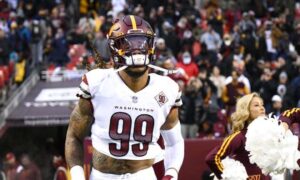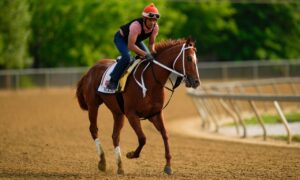
PlayVirginia recently interviewed writers from our network who specialize in covering sports betting in various states. The purpose of this conversation was to gain insights into the strengths and weaknesses of other states’ sports betting markets, in order to provide valuable lessons for Virginia’s upcoming online sports betting launch.
Today marks the second part of our “States of Sports Betting” trilogy. In the previous segment, we explored the accomplishments of various states. In this follow-up, we delve into the errors made by Illinois, Michigan, West Virginia, Nevada, and other states while venturing into the realm of sports betting.
Will Virginia be able to prevent these mistakes?
In 2018, the US Supreme Court’s decision to overturn the Professional and Amateur Sports Protection Act (PASPA) opened the doors to a thriving sports betting industry, turning it into a significant enterprise in this nation.
In recent times, an increasing number of US states have embraced the concept of sports betting, resulting in the opening of new markets. These legal and regulated sportsbooks have witnessed customers legally placing bets worth almost $33 billion.
Nevertheless, the anticipated path to wealth through state-approved sports betting has not materialized as expected by certain lawmakers. States have encountered difficulties in different aspects of the endeavor, including noncompetitive markets, restricted betting choices, technological challenges, and inadequate communication. Additionally, customers have not consistently demonstrated understanding or patience in these situations.
Overall, our writers have expressed optimism about the initial progress of their local sports betting markets. In fact, many found it challenging to identify any drawbacks or negative aspects.
However, other writers faced challenges for completely distinct reasons.
Joe Boozell of PlayIllinois jokingly expressed, “Choosing only one is quite challenging!”
In order for Virginia to become one of the market leaders, it is essential to steer clear of the following mistakes.
Top-heavy marketplace
At first glance, Virginia seems well-positioned for a thriving and fiercely competitive market. With the Virginia Lottery now in charge of regulating sports betting in the state, they are mandated by lawmakers to issue a minimum of four licenses and have the potential to grant up to 12 licenses.
Customers in areas with a limited market, such as Washington, DC, often experience difficulties due to a scarcity of options, unfavorable prospects, and a lack of enticing promotions.
Nevertheless, in states with numerous operators, there exists an imbalance among sportsbooks. According to Jake Garza from PlayIndiana, while some thrive, others simply fail to keep up.
The result is an imbalanced marketplace with a top-heavy structure.
Garza stated that there is a definite hierarchy among the state’s 10 online sportsbooks. He highlighted DraftKings, FanDuel, and PointsBet as the most user-friendly platforms, constantly providing numerous promotions every week. BetMGM ranks as the state’s third most popular book; however, it lacks substantial promotional offers. The same can be said for the remaining sportsbooks in the state.
If you prefer to view it negatively, another drawback is the limited selection of 10 sportsbooks available. Surprisingly, states like Colorado already offer more choices compared to Indiana, despite legalizing sports betting much later.
Ultimately, the winners and losers of Virginia sportsbooks will be determined by the market. However, if the market maintains a fair and competitive environment, players have the potential to enjoy substantial benefits.
Restrictions on certain bets
As previously stated, Boozell has observed numerous mistakes in Illinois, with lawmakers being responsible for a significant portion of the problems, such as remote-registration challenges.
Another problem?
Boozell expressed his opinion, stating, “If I had to choose, I believe the bans on specific wagers are the most significant. Unfortunately, betting on Illinois colleges such as the University of Illinois, Northwestern, DePaul, and others is still not allowed here. This restriction possibly pushes people towards offshore options.”
In July, there was a peculiar period when betting on numerous golf events was forbidden owing to concerns regarding amateur involvement.
In addition, Virginia will also prohibit bettors from placing bets on in-state colleges and universities.
Even though New Jersey has emerged as the leader in US sports betting, it still prohibits placing bets on schools within the state.
According to Bill Gelman from PlayNJ, betting on New Jersey college teams is prohibited, even if they compete in other states. Additionally, wagering on college sporting events held within New Jersey is not allowed. Therefore, if an NCAA tournament were to occur in this state, bookmakers would be unable to accept bets.
While lawmakers often implement such bans to satisfy university administrators, there are various other forms of restricted betting. Iowa’s sports betting industry has experienced consistent and significant growth since its launch. However, according to Derek Helling from PlayIA, the market does encounter one obstacle.
He stated that the statutory limitations are the reason why books in Iowa cannot accept bets on the NBA and NFL Drafts as well as esports. He also mentioned that the Iowa Gaming Association is actively urging legislators to modify the law pertaining to drafts and esports. Currently, this is the primary flaw in the market.
Virginia, a state without any professional sports teams, relies heavily on its university sports programs. The extent to which limited betting affects legal markets is difficult to measure. However, it is clear that individuals who already place bets with illegal offshore platforms or local bookies are less motivated to shift their activities to legal sportsbooks in Virginia.
Tech issues and delays
Sports bettors who have resorted to offshore books or bookies have probably encountered various inconveniences and frustrations. The appeal of legal sports betting was expected to offer convenience and safety.
The implementation of sports betting and online wagering has been disappointingly sluggish in certain states, despite their legalization.
Matt Schoch of PlayMichigan expressed his dissatisfaction with the delayed online launch of Michigan sports betting, particularly during the ongoing pandemic. Despite the legalization of online gambling in Michigan on December 20, 2019, it has taken a year for the apps to be launched. However, there is hope for a potential launch this month.
Sports betting became legal in Indiana on September 1, 2019, followed swiftly by the launch of betting apps a mere month later.
Even worse, the customer experience can become even more frustrating when those apps deliver a below-average performance.
Katie Kohler from PlayPennsylvania stated that people anticipate mobile betting to be efficient and easy to use. Any factors that hinder this process can lead to frustration. For example, some users have encountered problems with geolocation or experienced delays of one or two minutes to get geolocated. In today’s fast-paced society, even though such occurrences may be infrequent, waiting for such a short period can be perceived as a significant inconvenience. When individuals are eager to log in and place a bet, they do not want to endure any delays.
Occasionally, and I must emphasize that it is quite uncommon, there were instances, not caused by the operator but rather due to a problem with the software partner, where certain websites experienced downtime at the onset of the NBA playoffs. It truly couldn’t have happened at a worse time.
According to Kimberly Yuhl from PlayWV, states may also impose burdensome technical requirements, which can serve the purpose of internal controls or to create an illusion of transparency. Nevertheless, these requirements can also pose obstacles that frustrate sportsbook operators.
“The ultra-conservative approach of the WV Lottery is, in my opinion, the most unfavorable aspect of WV sports betting,” she expressed. “Requiring all aspects of the betting process to be hosted on in-state servers diminishes its attractiveness to operators.”
Virginia is eagerly anticipating its time to shine, with all parties, regulators, operators, and players hoping for a seamless experience, at least from a technical standpoint.
Customers struggle to deposit on betting apps
At first, Virginia’s sports betting will solely occur online. The physical retail establishments will only start accepting bets once the Virginia casinos launch in 2022 and 2025.
Despite its convenience, mobile betting can sometimes be a hassle. Even in Nevada, which was once the global leader in sports betting, the transition from retail to online wagering has faced challenges. The in-person sign-up requirements have caused frustration among potential bettors, as well as the unexpected absence of promotional offers.
However, according to Marc Meltzer from PlayNevada, there is another peculiar aspect of online sports betting in Las Vegas.
According to him, funding an account in Nevada is not as simple as linking a credit card, as there is only one option available. This slightly more complex approach results in fewer individuals choosing to fund their accounts through mobile devices.
If a more convenient choice was available, I believe more people would opt to fund their accounts through mobile devices.
Virginia’s sportsbooks should not encounter any limitations. Nevertheless, due to the necessity for sportsbooks to authenticate players’ identities and the various complications that can arise with deposits, withdrawals, and bonus redemptions, it is inevitable that issues will arise.
Reporting on market progress
Transparency is vital for regulators, lawmakers, operators, customers, and industry enthusiasts alike. A comprehensive understanding of the market’s well-being requires that all these stakeholders have access to relevant information.
The most effective approach to obtain it is through thorough monthly reporting.
Every month, states in the US that have legalized sports betting disclose information regarding the betting activities of the previous month. However, the effectiveness of this disclosure method varies among different states.
The provided information enables individuals to make valuable comparisons of the sports betting market between different states and specific sports. Additionally, it allows stakeholders within a particular state to evaluate the local market. In instances where sports betting has proven to be successful in certain states, the only setback may be inadequate monthly reporting.
According to Ian St. Clair from PlayColorado, Colorado’s handling of the sports betting launch was commendable. However, he suggests that there is room for improvement in the reporting of monthly figures. While the delay in releasing reports is not a major concern, St. Clair believes that the current reports lack detail and are insufficient.
Which sportsbooks are performing strongly? Can you provide a breakdown of the situation? While the state provides data on the sports that were wagered on, it’s crucial to understand the dominant players in the market and the preferred apps used by people.
Virginia has made commendable progress as it prepares for the imminent launch of the commonwealth. Among its achievements, the VA Lottery’s monthly sports betting reports are expected to become a coveted asset for the entire industry.







